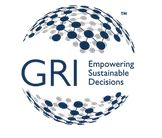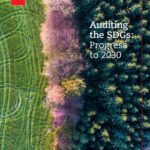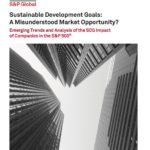
At a recent meeting with investors in Stockholm, GRI and UN Global Compact brought the 2030 Agenda for Sustainable Development to the table. The discussion highlighted current bottlenecks in sustainable investment and what should be done to resolve them. The outcomes of this discussion have been formalized in the Stockholm Declaration.
According to the 2016 Global Sustainable Investment Review, the total assets directed towards sustainable and responsible investment strategies globally amounted to $22.89 trillion in 2016, growing at a remarkable rate of 25% from 2014. The story revealed by this figure is one of the rapidly expanding influence of the investor community on the agenda for sustainable development.
Controlling the flow of vast amounts of capital gives the investment community considerable power in determining the success of the Sustainable Development Goals (SDGs), such as SDG #1: No Poverty. “By choosing to invest in business models and value chains that enable stable, inclusive and sustainable markets, investors can instigate a systemic impact that decisively improves people’s livelihoods and accelerates the fight against poverty, this being in accordance with the Financing for Development Agenda and Addis Ababa Action Agenda,” highlighted Lennart Båge, acting Director of the Swedish International Development Cooperation Agency (Sida), at the time of the conference.
Getting investors talking about SDGs
To trigger a big impact on the 2030 Agenda for Sustainable Development, GRI and UN Global Compact (UNGC) called on the investor community to engage in the discussion on SDGs. During a two-day event ‘Investing for sustainable development and sustainable impact towards 2030’, held in Stockholm on 3-4 May, speakers, panelists and round-table discussions contributed to expanding the conversation around investors’ expectations and vision regarding sustainable investment and SDG reporting by companies. To encourage greater investor engagement, the UN-supported Principles for Responsible Investment (PRI) was invited to co-convene these discussions. PRI is an investor initiative, which works to promote responsible investment among its international network of signatories.
The event, hosted by Sida, received an overwhelming response, drawing in 80 participants including senior or CEO level representatives from several Nordic and other pension funds, insurance companies and fund managers, including Alecta and Folksam, co-hosts of the event. The discussions brimmed with expert insights, described below, which GRI and UNGC aim to concretize in their Reporting on SDGs Action Platform, to better meet the reporting needs of companies and investors.
What investors need to make sustainable decisions
One of the prime outcomes of the meeting was that corporate reporting on SDGs needs to be current, comparable, coherent, and concise. Since investors often rely on data analysis in their decision making, it is vital that companies provide information on environmental, social, and governance (ESG) factors in a uniform manner. This is currently a bottleneck restricting sustainable investment strategies. An online and standardized reporting tool that helps companies to report using a set framework aligned with the SDGs, would serve as a significant stride towards overcoming this obstacle.
“We need to allocate more capital to sustainable investments; however, it also means that we need to address certain bottlenecks. Quality disclosure of sustainability information is vital for progress in SDG investment. Standardization and simplification is key for this aim, and an SDG reporting tool that achieves this could serve as a game-changer,” elaborated Magnus Billing, CEO of Alecta.
In addition to formulating practical project proposals for SDG reporting tools, the meeting group also drafted the Stockholm Declaration, emphasizing the commitment of the gathered investment community towards contributing to the 17 SDGs. As expressed by Kris Douma, Director of Investment Practices and Reporting at PRI, “Institutional investors play a key role in financing solutions to global challenges such as poverty, inequality, social justice, and climate change. The Stockholm Declaration recognizes the work that investors are already doing to drive sustainable development, and takes it forward by emphasizing their commitment to improve corporate reporting on SDGs, and in turn foster sustainable investment decisions.”
The co-conveners of the meeting will follow up on the conclusions derived from the event, and will offer additional opportunities to investors to become part of the conversation on enabling sustainable investment.
The Reporting on SDGs Action Platform is a groundbreaking initiative by GRI and UNGC to offer a clear and simple framework for the private sector to assess and report their SDG contributions. Find out more about the Action Platform, its key milestones and outcomes here.



